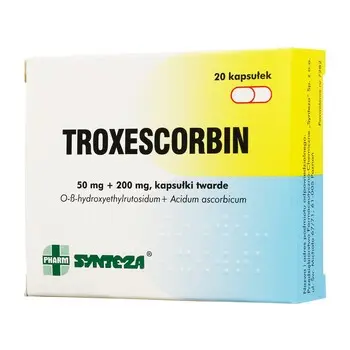Contents
Troxescorbin is a drug used as an auxiliary in the treatment of excessive capillary permeability, in disorders of the venous circulation. The preparation contains ascorbic acid and troxerutin. Troxescorbin capsules are available over the counter.
Troxescorbin (Synthesis)
| form, dose, packaging | availability category | the active substance |
| grave (Chapter 20) | OTC (over-the-counter) | ascorbic acid, troxerutin (ascorbic acid, troxerutin) |
SUBSTANCE 1 capsule contains: 0,2 g of ascorbic acid, 0,05 g of troxerutin
ACTION
Troxescorbin is a combined preparation containing vitamin and a drug that reduces the permeability of capillaries, a derivative of rutin.
Troxescorbin – indications and dosage
Troxescorbin contains ascorbic acid and troxerutin. It is used as an auxiliary in the treatment of excessive capillary permeability, in disorders of the venous circulation.
Dosage
- Orally, after a meal. Usually 1-3 caps / day.
Troxescorbin and contraindications to use
A contraindication to the use of Troxescorbin is hypersensitivity to any of its components.
Troxescorbin – warnings
- Use Troxescorbin with caution in the case of cholelithiasis, urolithiasis, gout, oxaluria, thalassemia, sideroblastic anemia, haemochromatosis, lack of blood glucose-6-phosphate dehydrogenase.
- High doses of vitamin C may affect laboratory blood glucose tests.
- Troxescorbin should not be used during pregnancy and breastfeeding, due to the lack of data on its safety.
- There is no information on the effect of the drug on the ability to drive and use machines.
Troxescorbin – interactions
Large doses of ascorbic acid:
- intensify the toxic effects of sulfonamides (risk of crystalluria),
- can reduce the effect of tricyclic antidepressants, phenothiazines,
- may increase the effect of anticoagulants (coumarin derivatives),
- may increase the absorption of iron from the gastrointestinal tract, prolong the duration of action of paracetamol.
- The use of vitamin C in high doses (1 g or more per day) may affect blood and urine test results based on oxidation-reduction reactions.
Troxescorbin – side effects
During long-term use of high doses of vitamin C (over 600 mg daily), the following may occur:
- vomiting or nausea
- Headache,
- reddening,
- hives
- increased urination
- in the case of vitamin C doses above 1 g per day, the following may occur: diarrhea, nephrolithiasis.










